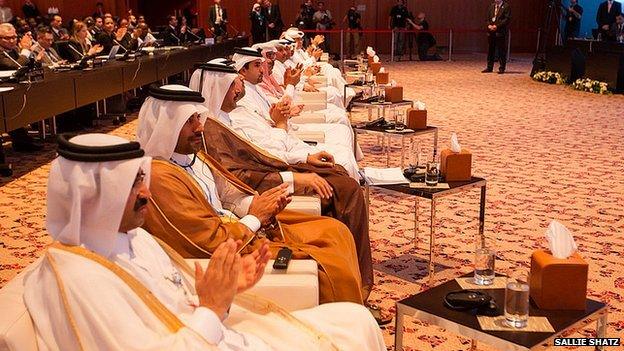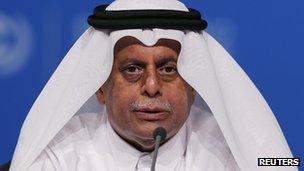Doha climate talks represent 'golden opportunity'
- Published

It is the first time a Gulf state has hosted global climate negotiations
The latest round of UN climate talks have opened in Doha, the capital of Qatar.
More than 17,000 participants from all over the world are expected to gather in the Gulf state over the next two weeks.
The President of the meeting said it was a "golden opportunity" to make progress on a new global climate deal.
But many delegates remain concerned that divisions between developing and wealthy nations will hamper progress.
The meeting elected the former Qatari energy minister H E Abdullah bin Hamad Al-Attiyah, as President of the Conference of the Parties (COP18, external).
In his opening remarks he said the "phenomenon" of climate change was a common challenge and the meeting in Doha was critical.
"This is an historic conference," said Mr Al-Attiyah, "it is of vital importance considering the items on its agenda. It is a turning point in the negotiations on climate change."
Some delegates were critical of the decision to hold the meeting in a country with some of the highest per capital emissions of carbon dioxide on earth. Jennifer Morgan, from the environmental think tank World Resources Institute, external called on the Qataris to announce actions to curb their own carbon footprint.

Mr Al-Attiyah hopes the negotiations will mark a "turning point"
"I think the best way they could show their intent would be to announce what action or pledge they are going to put forward as part of this entire negotiation," she told BBC News. "They don't currently have anything on the books."
"There's much poorer countries who have said they are going to go climate neutral, so if they want to set the record straight that they are in this for the climate, then putting forward some sort of commitment early on, would I think help." she said.
There are also concerns that the meeting could end in stalemate as old divisions between rich and poor resurface.
Delegates will seek to negotiate a new commitment period for the Kyoto Protocol, external, the first phase of which runs out at the end of the year. Many poorer nations want the wealthier countries to take on substantial new cuts in carbon for the next five years.
Increasing ambition
A statement from a group of over 100 of the poorest and most at risk nations demanded action on this issue.
"The Kyoto Protocol is more than a treaty, it is the foundation upon which our multilateral effort to address climate change rests," it said.
"The countries most responsible for the crisis must agree to a second commitment period under the Kyoto Protocol that will deliver genuine benefits to the climate that sustains us all. Currently, what is on the table falls far short of this climate imperative."
There are also likely to be serious disputes about finance and about the issue of "hot air" - the carrying over of unused permits to emit carbon.
Some of these issues may have to be resolved by cabinet ministers from more than 100 countries who will join the negotiating teams for the last four days of the meeting.
But Executive Secretary of the United Nations Framework Convention on Climate Change (UNFCCC), Christiana Figueres expressed the hope that the negotiators themselves could make progress
"May I dare say that much of this can be accomplished before the high level segment, to allow this COP to finish not on Saturday, not on Sunday but actually make history by finishing on Friday," she said.
- Published25 November 2012
- Published21 November 2012
- Published23 August 2012
- Published10 October 2012